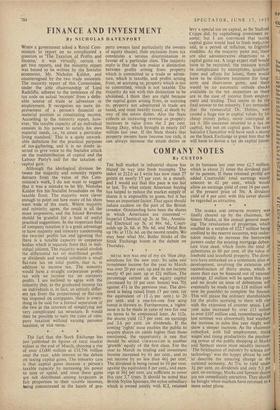FINANCE AND INVESTMENT
By NICHOLAS
DAVENPORT
WHEN a government asked a Royal Com- mission to report on so complicated a question as 'The Taxation of Profits and Income,' it was virtually certain to get two reports, and the minority report was bound to be written by the Socialist economist, •Mr. Nicholas Kaldor, and countersigned by the two trade unionist's. The majority report of this Commission, under the able chairmanship of Lord Radcliffe, adheres to the insistence of the tax code on actual 'receipts' from a 'defin- able source of trade or adventure or employment. It recognises no mere im. provement of a person's financial or material position as constituting income. According to the minority report, how- ever, 'the taxable capacity of an individual consists in his power to satisfy his own material needs, i.e., to attain a particular living standard.' This is a quite unwork- able definition for the practical purposes of tax-gathering, and it is no doubt in- serted to give voice to the Socialist attack on the maldistribution of capital and the Labour Party's call for the taxation of capital gain.
Although the ideological division be- tween the majority and minority reports detracts from the value of this Com- mission's work, I do not want to suggest that it was a mistake to let Mr. Nicholas Kaldor fire his Socialist broadsides on the taxable front. The majority were clever enough to point out how many of his shots went wide of the mark. Where majority and minority agree, the result is all the more impressive, and the Inland Revenue should be grateful for a host of useful practical suggestions. In the important field of company taxation it is a great advantage to have majority and minority condemning the two-tier profits tax and agreeing that there is a taxable capacity in corporate bodies which is separate from that in indi- vidqal citizens. The niajority would abolish the differential tax on distributed profits or dividends and would substitute a small flat-rate tax on total profits, that is, in addition to income tax. The minority would have a straight corporation profits tax with no income tax on company profits. I am inclined to agree with the minority that, as the graduated income tax on individuals is, in fact, an entirely differ- ent tax from the proportional or 'flat-rate tax imposed on companies, there is every- thing to be said for a formal separation of the two in the interests of simplifying our very complicated tax structure. It would then be possible to vary the rates of com- pany taxation without varying personal taxation, or vice versa.
* * *
The fact that the Stock Exchange has just 'published its figures of total market values at the end of March, showing a rise of over £3,000 million at £33,796 million over the year, adds interest to the debate on taxing capital gains. The minority case is that capital gains increase a person's taxable capacity by increasing his power to save or spend, and since these gains are not distributed among taxpayers in fair proportion to their taxable incomes, being concentrated in the hands of pro-
perty owners (and particularly the owners of equity shares), their exclusion from tax constitutes a serious discrimination in favour of a particular class. The majority reply is that the law makes a distinction between profits arising from property which is committed to a trade or adven- ture, which is taxable, and profits arising from, or accruing to, property which is not so committed, which is not taxable. The majority do not wish this distinction to be abolished. I think they are right because the capital gains arising from, or accruing to, property not adventured in trade are taxed, and most heavily taxed, at death by way of the estate duties. -Also the State collects an increasing revenue as property increases in value from the 2 per cent. Stamp Duty, which brought in nearly £45 million last year. If the State thinks that property owners have become too rich, it can always increase the estate duties or
levy a special tax on capital, as Sir Stafford Cripps did, by capitalising investment in- come; but I am Convinced that taxing capital gains would lead to fresh inequities and, in a period of inflation, to frightful muddles. As the majority point out, there are also administrative objections to a capital gains tax. A large expert staff would have to be recruited; the measure would be complicated by exemptions, qualifica- tions and offsets for losses; there would have to be different treatment for long- term and short-term gains; and there would be no automatic outside checks available to the tax inspectors as there are in the case of income from employ- ment and trading. That seems to be the final answer to the minority. I am reminded that the resourceful' Dr. Dalton, who caused a huge rise in capital values by his cheap money policy, never attempted to tax it. His successor resorted to a tax on capital, but not on capital gain. The next Socialist Chancellor will have such a slump on the Stock Exchange to greet him that he will have to devise a tax on capital ,josses.


































 Previous page
Previous page